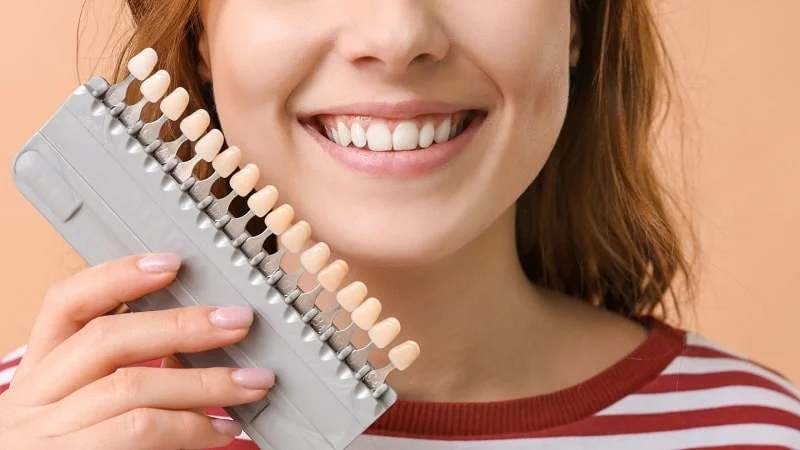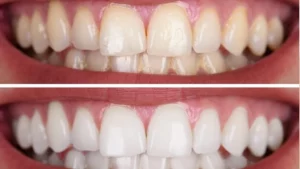Welcome to a discussion about a simple yet essential aspect of maintaining your smile: brushing your veneers. If you have veneers, you’ve likely invested in enhancing the appearance of your teeth. These thin coverings not only improve your smile but also protect your natural teeth underneath. Many people wonder do you have to brush veneers and the answer is yes! It’s important to understand that veneers, though durable, still require attention to ensure their longevity and the health of your teeth. Let’s explore why proper care for your veneers matters and how to go about it.
Proper Care for Veneers
When it comes to maintaining your veneers for a long-lasting, beautiful smile, a solid oral care routine is essential. Let’s dive into the details of how to care for your veneers effectively.
Brushing and Cleaning
- Choose the Right Toothbrush: Opt for a soft-bristle toothbrush to prevent any harm to your veneers. Electric toothbrushes with gentle settings can also be a good choice.
- Use Non-Abrasive Toothpaste: Select toothpaste that doesn’t contain harsh abrasives. This safeguards your veneers from getting scratched.
- Brush Gently: Employ small circular motions to gently clean your veneers and teeth. Avoid using excessive force to prevent any potential damage.

Flossing and Interdental Cleaning
- Floss Between Teeth: Utilize dental floss to clean between your natural teeth and veneers. This eliminates plaque buildup and maintains healthy gums.
- Consider Interdental Brushes: These tiny brushes can help you clean hard-to-reach areas around your veneers, ensuring comprehensive cleanliness.
Read Also;Can Veneers Fix An Open Bite?
Diet and Lifestyle Considerations
- Be Mindful of Staining Foods: Cut back on foods and drinks that can stain your veneers, such as coffee, tea, and red wine.
- Avoid Harmful Habits: Refrain from biting on hard objects or using your teeth as tools, as these actions could damage your veneers.
Regular Dental Check-ups
- Scheduled Visits: Regularly visit your dentist for professional check-ups. These visits help monitor the condition of your veneers and overall oral health.
- Professional Cleaning: Professional cleaning removes any stubborn plaque or stains, enhancing the appearance and longevity of your veneers.
Do You Have to Brush Veneers?
If you’ve been wondering whether brushing is necessary for maintaining your veneers, let’s clear up the confusion and get into the details.
Addressing Misconceptions
- Veneers and Oral Care: Despite their porcelain or composite nature, veneers are not exempt from needing oral care. They may be artificial, but they’re attached to your natural teeth and require proper attention.
- Preserving Your Smile: Brushing your veneers isn’t just about the veneers themselves; it’s about protecting your underlying teeth. Neglecting oral hygiene can impact the health of both.
Recommended Oral Care Routine for Veneers
- Regular Brushing: Treat your veneers like your natural teeth. Brush gently twice a day with a soft-bristle toothbrush to remove food particles and plaque.
- The Right Toothpaste: Opt for a non-abrasive toothpaste. Harsh abrasives can gradually wear down the surface of your veneers.
- Gentle Technique: Use small circular motions while brushing. Avoid aggressive scrubbing to prevent potential damage.
Read Also: Do You Need Braces Before Veneers?

Choosing the Right Tools
- Soft-Bristle Brushes: Select a soft-bristle toothbrush to avoid scratching the veneer’s surface.
- Electric Toothbrushes: If you prefer electric toothbrushes, choose one with adjustable settings and use the gentle mode.
Additional Care Tips
- Flossing Matters: Don’t forget to floss between your natural teeth and veneers. This helps prevent gum disease and maintains overall oral health.
- Say No to Abrasives: Steer clear of abrasive mouthwashes and toothpaste, as they can diminish the veneers’ shine and integrity.
- Diet Awareness: Minimize consumption of staining foods and drinks, like coffee or tea, to keep your veneers looking their best.
Regular Dental Check-ups
- Professional Insight: Regular dental visits are vital. Your dentist can assess the condition of your veneers and identify any potential issues.
- Deep Cleaning: Professional cleaning ensures that hard-to-reach areas around your veneers stay plaque-free and polished.
Do You Have to Brush Veneers?
Let’s delve into the important question of whether brushing is necessary for maintaining your veneers, and explore the details that matter.
Addressing Misconceptions
- Veneers and Oral Care: While veneers are artificial coverings, they are attached to your natural teeth. This means that they need attention and care, just like your original teeth.
- Holistic Dental Health: Brushing your veneers is not just about their appearance. It’s about the overall health of your mouth. By maintaining your veneers, you’re also preserving the health of the teeth underneath.
Recommended Oral Care Routine for Veneers
- Regular Brushing: Make it a habit to gently brush your teeth and veneers twice a day. This helps remove food particles and plaque buildup.
- Choosing Toothpaste: Opt for toothpaste that is gentle and non-abrasive. Harsh toothpaste can potentially damage the surface of your veneers.
- Effective Brushing Technique: Use small circular motions while brushing. Avoid applying excessive pressure to prevent any harm.
Selecting the Right Tools
- Soft-Bristle Brushes: Choose a toothbrush with soft bristles. This minimizes the risk of scratching the veneer’s surface.
- Electric Toothbrushes: If you prefer electric toothbrushes, select one with adjustable settings and use the gentle mode to ensure careful cleaning.
Additional Care Tips
- Don’t Forget Flossing: Floss between your natural teeth and veneers to maintain gum health and prevent plaque buildup.
- Avoid Abrasive Products: Stay away from mouthwashes or toothpaste with abrasive elements. These can diminish the veneer’s shine and strength over time.
- Mind Your Diet: Reduce your consumption of foods and drinks that can stain, like coffee and tea. This helps keep your veneers looking bright.
Regular Dental Check-ups
- Professional Insights: Regular visits to your dentist are crucial. They can evaluate the condition of your veneers and detect any potential issues early.
- Thorough Cleaning: Professional cleaning ensures that areas around your veneers remain clean and polished, enhancing their longevity.
Additional Care Tips for Veneers
Beyond brushing, there are important steps to ensure your veneers stay vibrant and durable. Let’s delve into these key aspects.
Avoid Abrasive Products
- Choose Toothpaste Wisely: Opt for non-abrasive toothpaste to protect the surface of your veneers from unnecessary wear and tear.
- Gentle Mouthwash: If you use mouthwash, select one that doesn’t contain abrasive ingredients. This helps maintain the veneers’ shine.
Read Also: Dental Veneers Pros and Cons: Is it the Right Choice for You?
Mind Your Diet and Habits
- Limit Stain-Inducing Foods: Cut down on foods and drinks that can stain your veneers over time, such as dark-colored beverages like coffee and red wine.
- Say No to Biting Hard Objects: Avoid using your teeth as tools or biting into hard objects, as this can risk chipping or damaging your veneers.
Conclusion
In conclusion, the importance of brushing your veneers cannot be overstated. While veneers are a cosmetic enhancement, they still require diligent care to ensure both their longevity and the health of your natural teeth.
Incorporating a proper oral care routine, selecting the right tools and products, and being mindful of your diet and habits contribute to the overall well-being of your veneers.
Regular dental check-ups play a vital role in monitoring your veneers’ condition and addressing any potential concerns promptly.
By following these guidelines, you actively participate in maintaining a stunning smile that stands the test of time.
Frequently Asked Questions (FAQs)
Q1: Do veneers require special care compared to natural teeth?
A: Veneers demand a similar level of care to natural teeth. Regular brushing, flossing, and dental visits are essential for both.
Q2: Can I use any toothpaste with veneers?
A: Opt for non-abrasive toothpaste. Harsh abrasives can damage the veneer’s surface. Your dentist can recommend suitable options.
Q3: Are electric toothbrushes safe for veneers?
A: Yes, they are safe. Choose an electric toothbrush with a gentle mode and use it carefully to avoid excessive pressure.
Q4: Can veneers stain?
A: While veneers are stain-resistant, they can still be affected by highly pigmented foods and drinks. Minimize consumption to maintain their appearance.
Q5: Is flossing necessary for veneers?
A: Absolutely. Flossing between your natural teeth and veneers prevents plaque accumulation, promoting gum health.
Q6: Can veneers chip or break?
A: Veneers can be durable, but they are not indestructible. Avoid using your teeth as tools and biting on hard objects to prevent damage.
Q7: How often should I have dental check-ups with veneers?
A: Regular check-ups every six months are recommended. Your dentist can assess veneer condition and address any concerns.
Q8: Can I drink coffee or tea with veneers?
A: Yes, but moderation is key. Staining substances like coffee and tea can affect the appearance of your veneers over time.
Q9: Will my veneers need to be replaced eventually?
A: With proper care, veneers can last for many years. However, they might need replacement due to wear or damage in the long run.
Medical References
- Peumans M, Van Meerbeek B, Lambrechts P, Vanherle G. The 5-year clinical performance of direct composite additions to correct tooth form and position. I. Esthetic qualities. Clin Oral Investig. 1997;1(1):12-22. doi:10.1007/s007840050002
- Le Bell-Rönnlöf AM, Lassila LV, Kangasniemi I, Vallittu PK. Bonding of composite resin luting cements to ceramic veneers. J Dent. 2005;33(7):597-603. doi:10.1016/j.jdent.2004.10.013
- Fornaini C, Brulat N, Milia G, Rocca JP, Haddi A. A new noncontact method for veneers preparation. Int J Esthet Dent. 2019;14(2):200-212.
- Meijering AC, Roeters JJ, Mulder J, Creugers NH. Bleaching and bonding of porcelain veneers: a 6-month follow-up. J Adhes Dent. 2000;2(1):13-18.
- Heymann HO, Bayne SC. Aesthetic considerations for adhesive dentistry. Dent Clin North Am. 2007;51(2):491-502. doi:10.1016/j.cden.2007.02.003
- Magne P, Gallucci GO, Belser UC. Anatomic crown width/length ratios of unworn and worn maxillary teeth in white subjects. J Prosthet Dent. 2003;89(5):453-461. doi:10.1016/s0022-3913(03)00092-2



